SUMMARY
This is AI generated summarization, which may have errors. For context, always refer to the full article.
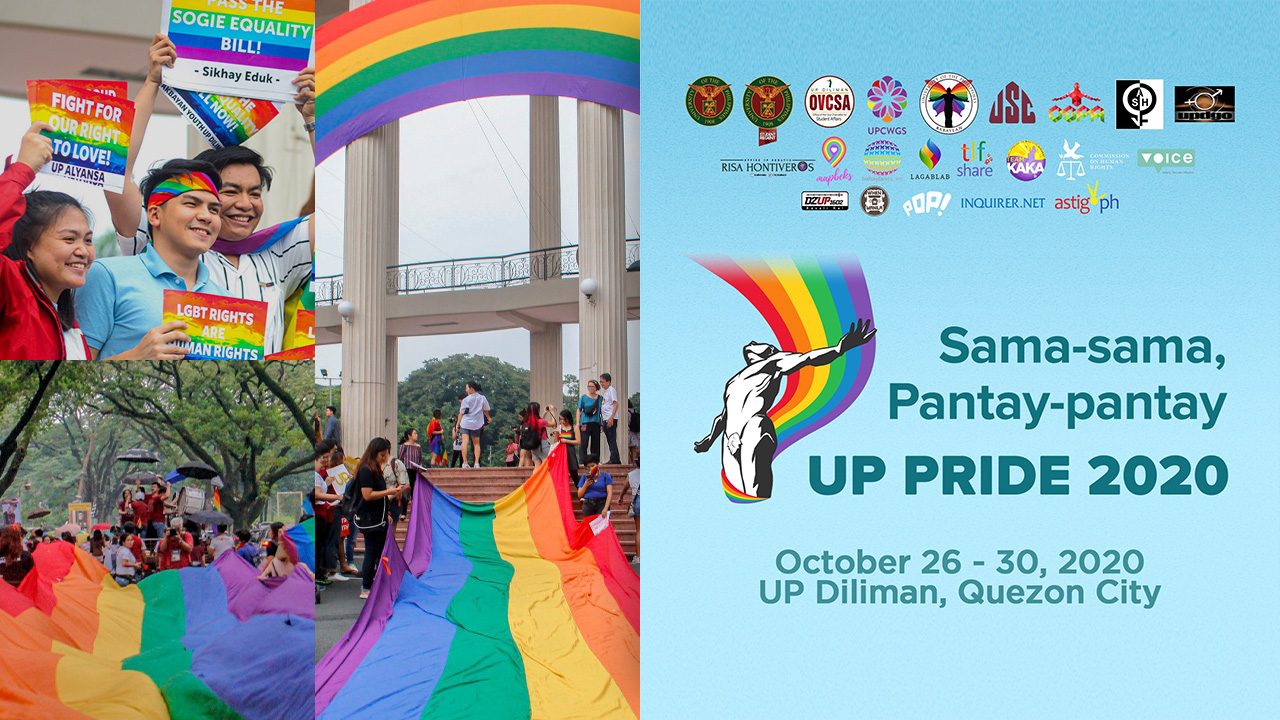
In a bid to push for the rights of the LGBTQ+ community even during the pandemic, the University of the Philippines (UP) will hold its annual UP Pride celebration online.
This year, UP Pride’s celebration anchored on the theme, “Sama-Sama, Pantay-Pantay,” that aims to unite the LGBTQ+ community and other marginalized sectors in their call for equality. This is the first time that the celebration on October 26 to 30 will be conducted virtually.
The event is organized by UP Babaylan, the first LGBTQ+ organization in the Philippines and in Asia, in partnership with prominent university offices in UP Diliman, as well as other advocacy groups and student organizations.
With the shift to a virtual celebration, organizers admitted they encountered difficulties, such as determining what platforms will best transform the online space to show solidarity.
“Ang hirap i-recreate ‘yung magic of Pride, ‘yung (It’s hard to recreate the magic of Pride online, the) power…but our goal is to translate that feeling of solidarity online,” said UP Pride 2020 co-head Venus Evangelista.
UP Pride has been an avenue for both the members of LGBTQ+ community and its allies to amplify their fight for gender equality and emancipation since 2008. It was first organized by UP Babaylan and the UP Student Council Gender Committee.
It became an official UP Diliman event in 2016 through its partnership with the Office of the Vice Chancellor for Student Affairs (OVCSA) and the UP Diliman Office of the Chancellor. For the first time, UP Pride 2020 partnered with the Commission of Human Rights (CHR) and the Office of the UP Student Regent, further expanding their reach.
Despite the challenges of transitioning online, UP Pride 2020 co-head Frances Chan emphasized how virtual celebrations can also be an opportunity for them to include different groups and individuals from other regions who weren’t able to join UP Pride in the past. They include progressive and sectoral groups, as well as LGBTQ+ students from other UP systems.
Bringing the ‘magic of Pride’ online
Since the online space allows interaction without physical limitations, UP Pride organizers took a more UP system-wide effort in leading the event by reaching out to other LGBTQ+ leaders from different UP campuses in Manila, Los Baños, Baguio, Visayas, and Mindanao, among others.
The celebration will include an opening event, equality talks, and roundtable discussions via Facebook Live. In hopes of recreating a space of solidarity, a virtual Pride hangout will be conducted through Roblox.
The first-ever Philippine Queer Studies Conference, organized by the UP Center for Women’s and Gender Studies (CWGS) will also have panel presentations, learning sessions, and symposia on LGBTQ+ issues from queer studies scholars, together with LGBTQ+ activists.
This conference aims to facilitate meaningful conversations and collaborations between the LGBTQ+ members of the academe and of activist groups.
An equality rally will also be held on Friday, October 30 in Oblation plaza to end the weeklong celebration.
Push for LGBTQ+ rights
The celebration of UP Pride also aims to recognize the struggles of the LGBTQ+ community during the pandemic.
For UP CWGS Director Dr Nathalie Africa-Verceles, the global health crisis has exacerbated the preexisting struggles of different sectors including the LBGTQ+ community.
“Some say, ‘Let’s just focus on COVID,’ but there are sectors that are severely affected by COVID, more so than others… Members of the LGBTQI community are disproportionately affected by the pandemic, which further justifies the need to celebrate UP Pride,” she said.
In a report by the United Nations Office of the High Commissioner for Human Rights (OHCHR) last April, it mentioned that LGBTQ+ may be particularly vulnerable during the pandemic. These areas of vulnerability included access to health services, domestic violence, and access to work and livelihood, among others.
Pride is a protest
This all the more strengthened UP Pride’s cause to push for stronger anti-discrimination and protection, both at the university-level and national-level.
The university’s gender policies, the UP Guidelines for Promoting Gender Equality and Women’s Empowerment and the UP Anti-Sexual Harassment Code, still do not have provisions that protect LGBTQ+ individuals from discrimination. To address this, the UP System Gender and Development Committee, together with the university’s offices of anti-sexual harassment, are working to amend this.
“In UP, we have to recognize that there are still gaps that we need to fill in order to protect those who are LGBTQI…that’s our effort at the university-level. We want a parallel effort at the national-level,” said Africa-Verceles.
The call for the passage of the national Sexual Orientation and Gender Identity Expression (SOGIE) equality law, as well as local SOGIE equality ordinances, continues in this year’s Pride celebration. (WATCH: What you need to know about SOGIE)
“[The SOGIE equality law] is one very salient way that they can immediately contribute to our fight… It’s a law that will guarantee equality on the basis of sexual orientation, gender identity and expression, and sex characteristics. How can that be so objectionable?” said Africa-Verceles.
The LGBTQ+ community has been pushing for the SOGIE equality law ever since it was filed back in 2000. Its latest version, Senate Bill No. 689, entitled “Anti-Discrimination on the Basis of Sexual Orientation, Gender Identity and Expression,” has not been passed in Congress after almost two decades.
Despite years of pushback and tireless interpellations, UP Pride organizers have continued to stand firm in their call for a national, full-fledged SOGIE equality law.
“Our goal is to forward the passage of anti-discrimination laws within Congress, nationally, and also anti-discrimination ordinances locally,” Chan said in a mix of English and Filipino. – Rappler.com
Add a comment
How does this make you feel?

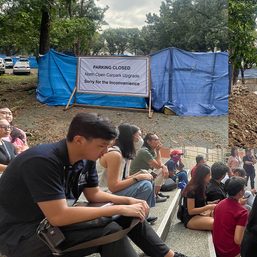
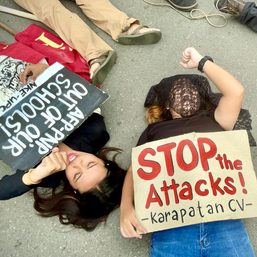
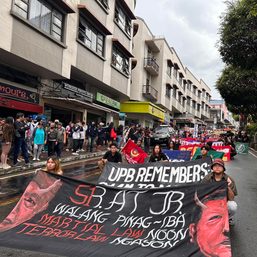



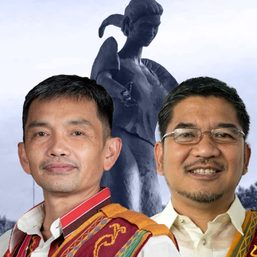
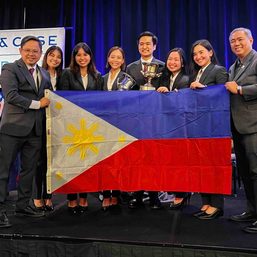

There are no comments yet. Add your comment to start the conversation.